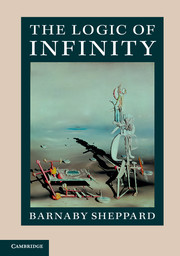Book contents
- Frontmatter
- Contents
- Preface
- Synopsis
- 1 Introduction
- 2 Logical foundations
- 3 Avoiding Russell's paradox
- 4 Further axioms
- 5 Relations and order
- 6 Ordinal numbers and the Axiom of Infinity
- 7 Infinite arithmetic
- 8 Cardinal numbers
- 9 The Axiom of Choice and the Continuum Hypothesis
- 10 Models
- 11 From Gödel to Cohen
- A Peano Arithmetic
- B Zermelo–Fraenkel set theory
- C Gödel's Incompleteness Theorems
- Bibliography
- Index
2 - Logical foundations
Published online by Cambridge University Press: 05 August 2014
- Frontmatter
- Contents
- Preface
- Synopsis
- 1 Introduction
- 2 Logical foundations
- 3 Avoiding Russell's paradox
- 4 Further axioms
- 5 Relations and order
- 6 Ordinal numbers and the Axiom of Infinity
- 7 Infinite arithmetic
- 8 Cardinal numbers
- 9 The Axiom of Choice and the Continuum Hypothesis
- 10 Models
- 11 From Gödel to Cohen
- A Peano Arithmetic
- B Zermelo–Fraenkel set theory
- C Gödel's Incompleteness Theorems
- Bibliography
- Index
Summary
Language
The universe cannot be read until we have learnt the language and become familiar with the characters in which it is written.
–Galileo GalileiBuilding a theory of sets
The axiomatic development of set theory is among the most impressive accomplishments of modern logic. It can be used to give precise meaning to concepts which were beyond the grasp of its vague predecessors. A successful set theory describes clearly the logical and extra-logical principles of mathematics.
We want a theory of sets to be at least powerful enough to cope with the concepts of classical mathematics, in particular we need to be able to speak about the number systems discussed in the introduction. We have seen that the systems of integers, rational numbers, real numbers, complex numbers and algebraic numbers (and beyond) can be built from the natural numbers using a handful of logical constructions. Thus our theory needs to be capable of describing a model of the natural numbers, that is, a collection of sets with a successor operator satisfying Peano's Postulates, together with such notions as ordered pairs, functions and other relations of various kinds. At the same time, and this is where the creative tension comes into play, we don't want the theory to be so loose and overconfident with its assignment of sets to admit such horrors as Russell's paradox.
Information
- Type
- Chapter
- Information
- The Logic of Infinity , pp. 185 - 238Publisher: Cambridge University PressPrint publication year: 2014
